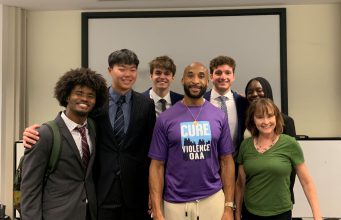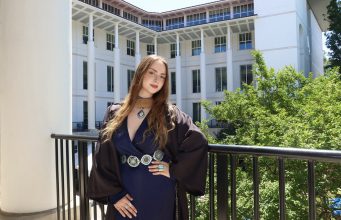Almost as soon as Evan Tao 25C arrived at Emory University, the first-year student was thinking about how best to pursue his interest in investing. While in high school, Tao had discovered algorithmic trading—a type of quantitative finance that uses computer code and software to execute trades.

After Tao discovered there wasn’t a specific quantitative finance track at Emory, he looked for a trading club to join. While doing his research, he discovered Goizueta Investment Management Group (GIMG), a BBA-student managed investment fund, but Tao wasn’t a BBA student, and the club didn’t focus on using mathematical models and datasets to analyze markets and execute trades.
Tao felt he couldn’t be the only Emory student who appreciated this approach to investing, so he started an Instagram group chat and asked if any of his fellow students wanted to form a trading club. So many students joined the chat that Tao was forced to switch to another communication platform. “The response motivated me to build the club,” he says.
Algorithm + Emory = Algory Capital
Tao named the club Algory Capital (a mash-up of “algorithm” and “Emory”), but he needed more than a catchy name. To form a legitimate club, the University requires a constitution with a statement of the club’s purpose and a faculty advisor. With the deadline to establish a club for the 2021-2022 school year looming, Tao put on his suit, walked to Goizueta Business School, and started knocking on doors. Jeffrey Busse, Goizueta Foundation Term Professor of Finance, was in his office when Tao knocked.

A self-proclaimed stock market enthusiast, Busse has been the faculty advisor for GIMG since its inception 11 years ago. “It turns out Evan’s interests are similar to mine in terms of both my research, as well as my personal interest in the stock market,” Busse explains. Tao and Busse talked for over an hour, and Busse agreed to serve as Algory Capital’s faculty advisor.
Over the fall and winter, Tao and several club members determined how the club would operate. This included requiring that new members complete basic quantitative analyst training online. All members need to earn their Bloomberg Market Concepts certification by taking a self-directed e-learning course. Those members interested in honing their computer modeling skills to design algorithms are directed to QuantConnect’s Boot Camp, a coding lab that gives students the skills necessary for quantitative trading. Algory Capital members then test their skills by engaging in paper trading via Interactive Brokers Paper Trading Lab.
After launching Algory Capital, Tao emailed Goizueta’s Interim John H. Harland Dean Karen Sedatole to make the argument that managing a fund that traded real money (as opposed to making “paper” trades) would “make a meaningful difference in the job opportunities for Goizueta BBAs,” Tao wrote. Tao estimates that more than half of Algory Capital’s nearly 50 members plan to enter the BBA program.
Busse joined the conversation sharing that Algory Capital would help first-year students “get an early start” toward careers in quantitative finance—roles that would require more computer science and mathematical skills than those acquired by a typical BBA student. “This focus would align with Emory University’s push toward artificial intelligence, machine learning, and data analysis,” Busse expounded.
Real Money and Meaningful Professional Skills
This spring, the plan to allow Algory Capital to trade with real money was approved. Busse has allocated $100,000 from the $3 million investment portfolio that he uses to teach his upper-level finance courses to be used by Algory Capital (the portfolio is carved out of Emory University’s overall endowment fund). This fall, Algory Capital will start executing and evaluating real-life trades. (Busse will handle the actual trades—as he also does for a similar fund managed by GIMG.)
Busse believes that Algory Capital will give students an advantage when trying to get placed in top-tier quantitative investment jobs.
“Goizueta has good connections to Wall Street, but we don’t have as many connections to money management—the Fidelities, the Vanguards, even hedge funds,” notes Busse. “Over time, these types of companies will see that we have skilled students in these areas who can provide value to their companies.”
Jenny Guo 25C has been in the club since last October. Guo, who plans to double major in computer science and mathematical economics, is excited about using real money to make trades, noting that the ability to do so provides “a platform for students with diverse backgrounds to fulfill their potential,” she says.
This organization can provide students a very good opportunity to explore career paths, connect with peers, and network with professionals in the quantitative finance area. That is really important for student recruiting.
Jenny Guo 25C
Part of Tao’s plan for Algory Capital is to expand the club’s corporate outreach and “build a pipeline for students,” he says.
Tao is equally excited about helping students connect. “Ultimately, the things you remember later in life aren’t necessarily the jobs you got, but the friends you made and the great experience you had during college,” Tao says.
Algory Capital has already collaborated with Georgia Tech’s Trading Club on the AmplifyMe Trading Competition and hopes to add speaking and networking events to their collaboration soon. Algory Capital also includes a social responsibility component: Members mentor underrepresented high school students in Metro Atlanta.
Applications to join Algory Capital will open in Fall 2022. Learn more here.











